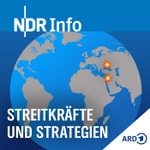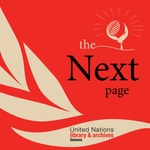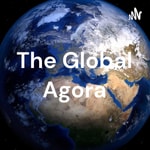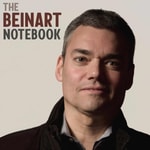War & Peace – Détails, épisodes et analyse
Détails du podcast
Informations techniques et générales issues du flux RSS du podcast.
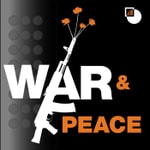

Hosted on Acast. See acast.com/privacy for more information.
Classements récents
Dernières positions dans les classements Apple Podcasts et Spotify.
Apple Podcasts
🇬🇧 Grande Bretagne - newsCommentary
31/07/2025#74🇬🇧 Grande Bretagne - newsCommentary
30/07/2025#54🇬🇧 Grande Bretagne - newsCommentary
29/07/2025#48🇩🇪 Allemagne - newsCommentary
29/07/2025#89🇬🇧 Grande Bretagne - newsCommentary
28/07/2025#91🇩🇪 Allemagne - newsCommentary
28/07/2025#51🇬🇧 Grande Bretagne - newsCommentary
21/07/2025#82🇩🇪 Allemagne - newsCommentary
17/07/2025#75🇫🇷 France - newsCommentary
16/07/2025#88🇬🇧 Grande Bretagne - newsCommentary
15/07/2025#92
Spotify
Aucun classement récent disponible
Liens partagés entre épisodes et podcasts
Liens présents dans les descriptions d'épisodes et autres podcasts les utilisant également.
See allQualité et score du flux RSS
Évaluation technique de la qualité et de la structure du flux RSS.
See allScore global : 79%
Historique des publications
Répartition mensuelle des publications d'épisodes au fil des années.
Prisoners of the Past? Political Crises and Ethnic Tensions in the Western Balkans
Saison 5 · Épisode 12
mardi 16 juillet 2024 • Durée 38:10
In this episode of War & Peace, Olga speaks with Crisis Group’s consulting senior Balkans analyst Marko Prelec about the enduring political and ethnic tensions in the Western Balkans. They discuss the looming risk of Bosnia and Herzegovina breaking up amid secessionist threats by authorities in Republika Srpska and grievances among Bosnia’s ethnic groups with its political system and its international supervision. They talk about the challenges of reconciliation in Bosnia as the country commemorates the anniversary of the Srebrenica Genocide this month. They then unpack the tensions between Kosovo and Serbia and Pristina’s efforts to assert authority in the Serb-majority north of the country. They also ask about the prospects of EU enlargement to the region and the lessons identified from Balkan efforts to remember, build on, and move past contentious histories.
For more about the topics discussed in this episode, check out our EU Watchlist commentary Helping Keep Bosnia and Herzegovina Together and our report Northern Kosovo: Asserting Sovereignty amid Divided Loyalties.
Hosted on Acast. See acast.com/privacy for more information.
A Long War in Ukraine? Perspectives from Kyiv and Washington
Saison 5 · Épisode 11
mardi 25 juin 2024 • Durée 36:49
In this episode of War & Peace, Olga and Elissa speak with Lucian Kim, senior Ukraine analyst at Crisis Group, about how perspectives on the war in Ukraine are evolving in Kyiv and Washington and how both capitals grapple with the prospect of a long war as the U.S. heads for elections. They speak about what has changed in Ukraine since the beginning of Russia’s full-scale invasion and how much unity there is among Ukrainian society and its leadership over the trajectory of the war. They unpack Ukraine’s new mobilisation law, how it is received by the military and ordinary citizens and whether it will have a substantial effect on the country’s war effort. They also assess where Washington’s Ukraine policy might be headed amid divisions in Congress over continued military support for Kyiv, how big of a role the war has played in the run-up to the U.S. elections and how Ukrainians view the prospect of a second Trump presidency.
For more about the topics discussed in this episode, check out our reports Ukraine: How to Hold the Line and A Fraught Path Forward for Ukraine’s Liberated Territories and our Q&A An Embattled Kyiv Looks for Aid in the Diplomatic Arena.
Hosted on Acast. See acast.com/privacy for more information.
Why Women Fight: Gender Dynamics in Insurgencies and Armies
Saison 5 · Épisode 2
mardi 24 octobre 2023 • Durée 35:24
Throughout history, women have been involved in conflict: as soldiers, as insurgents and as civilians. Yet, the ways in which men and women are treated on and off the battlefield and the contributions they make can vary widely, shaped in large part by deeply ingrained societal views about gender.
In this episode of War & Peace, Olga Oliker and Elissa Jobson are joined by Jessica Trisko Darden, Associate Professor of Political Science at Virginia Commonwealth University, to discuss how gender dynamics shape insurgencies and wars. They explore the reasons why women decide to go to war, what motivates insurgent groups and armed forces to recruit women and the perceived benefits and costs of greater gender parity. They discuss the roles women and men take on in war and why these often differ. They take a closer look at how these gender dynamics have played out in Ukraine and elsewhere, the institutional barriers women face within the military and Kyiv’s efforts to recruit more women into its armed forces. They also discuss how the conscription of women differs in armed forces around the world.
For more of Crisis Group’s analysis on the topics discussed in this episode, check out our Gender and Conflict page.
Hosted on Acast. See acast.com/privacy for more information.
Europe in the World
Saison 1 · Épisode 2
dimanche 22 septembre 2019 • Durée 23:33
Hosted on Acast. See acast.com/privacy for more information.
Europe and Iran
Saison 1 · Épisode 1
lundi 16 septembre 2019 • Durée 29:01
Hosted on Acast. See acast.com/privacy for more information.
The Days After: Humanitarian Crisis and Prospects for Peace in Karabakh and the Region
Saison 5 · Épisode 1
mardi 10 octobre 2023 • Durée 34:20
In the first episode of a new season of War & Peace, Olga Oliker is joined by Crisis Group’s South Caucasus experts, Olesya Vartanyan and Zaur Shiriyev, to talk about the implications of Azerbaijan regaining control of Nagorno-Karabakh in a one-day military operation on 19 September. The immediate consequences were the end of the enclave’s three decades of de facto self-rule and a mass exodus of ethnic Armenians. Olya, Zaur, and Olesya discuss the new refugee crisis, Armenia’s response and prospects for the enclave under Azerbaijani rule, including for any ethnic Armenians who stay or those who seek to return in the future. They also address the potential for both peace deals and renewed escalation between Armenia and Azerbaijan and what leverage outside actors, including the U.S., Russia (whose role has been fundamentally transformed), the European Union and Türkiye, can exert to make a sustainable peace more likely.
For more of Crisis Group’s analysis on the events in Nagorno-Karabakh, check out our recent statement Responding to the Humanitarian Catastrophe in Nagorno-Karabakh and our Nagorno-Karabakh page.
Hosted on Acast. See acast.com/privacy for more information.
NATO’s Vilnius Summit and Baltic Security
Saison 4 · Épisode 19
vendredi 28 juillet 2023 • Durée 29:23
On 12 July, NATO concluded its two-day summit in the Lithuanian capital, Vilnius. At the backdrop of Russia’s invasion of Ukraine, the decision to hold the meeting in one of NATO’s newer members and a country claimed by the Soviet Union for decades was seen as a sign of commitment to the alliance's eastern flank. The war in Ukraine was unsurprisingly the focal point of the summit, with NATO members committing to continued support for Kyiv and revamped deterrence in Europe as a whole and the Baltics in particular. But those who hoped Ukraine would be invited to join left disappointed.
This week on War & Peace, Olga Oliker and Elissa Jobson are joined by Lithuanian parliamentarian Dovilė Šakalienė to take stock of the summit, the shifting security situation in the Baltics and the future of NATO. They talk about the main takeaways from the summit and different perspectives on Ukraine’s prospective membership. They also talk about how Russia’s invasion of Ukraine has changed security perceptions and defence priorities in the Baltics. Finally, they discuss what other challenges loom for NATO, including what role the alliance might play should conflict between Taiwan and China occur.
For more of Crisis Group’s analysis on the topics discussed in this episode, check out our Europe and Central Asia program page.
Hosted on Acast. See acast.com/privacy for more information.
Ukraine’s Male Travel Ban and the Protection of Civilians in Wartime
Saison 4 · Épisode 18
mercredi 12 juillet 2023 • Durée 34:24
War, by definition, takes terrible tolls on civilian populations. Just what risks a given person faces depends on many factors, including gender, class and geography. While international law has evolved to protect both civilians and combatants at war, it is not always followed, to say the least, and governments often fail to adequately protect even their own civilian population. In Ukraine, the government's decision to ban most men aged eighteen to 60 from leaving the country has had unexpected effects on Ukrainians, both men and women.
This week on War & Peace, Olga Oliker and Elissa Jobson speak with Charli Carpenter, director of the Human Security Lab at the University of Massachusetts Amherst, about the protection of civilians in wartime, the gendered effects of conflict and how all of this is playing out in Ukraine. They discuss misconceptions about conflict and gender and the role of international law in protecting civilians. They delve into the Human Security Lab’s latest research on the perception and effects of Ukraine’s male travel ban and what both the Ukrainian government and its international partners can do to mitigate its unintended humanitarian and strategic consequences. Finally, they address how international law might evolve and how to bring governments to better adhere to them.
Make sure to check out Human Security Lab’s latest report, “Protecting Civilian Men's Right to Flee the Ukraine War: Strategic and Humanitarian Impacts”. For more of Crisis Group’s analysis on the topics discussed in this episode, check out our Ukraine country page and our Gender and Conflict page.
Hosted on Acast. See acast.com/privacy for more information.
The War in Ukraine: Rallying Point for the Left or New Neocon Adventure?
Saison 4 · Épisode 17
vendredi 30 juin 2023 • Durée 36:43
Western support for Ukraine’s war against Russia has faced continued scrutiny. Critics have compared the conflict to past American wars of choice, such as the invasions of Afghanistan and Iraq, which were informed by neoconservative foreign policy, aiming to promote peace and democracy through military means. Ukraine and its backers present a contrasting narrative, emphasising both defence against Russia's unprovoked invasion, and forwarding a narrative of this war as the frontline for democracy and freedom. So, is the war in Ukraine a conflict the left can get behind or is it driven by neoconservative ideology?
This week on War & Peace, Olga Oliker and Elissa Jobson talk with Hans Kundnani, Associate Fellow at the Chatham House Europe Programme, about the ideology behind Western support for the war in Ukraine and why it matters. They discuss whether the war in Ukraine should be seen as a left-wing progressive war or a neoconservative war, or neither. They explore the values and motivations behind Western support for Ukraine, comparing it to past conflicts and examining the role of democracy and human rights in shaping foreign policy. They also discuss the role of the Global South and the importance of considering its interests in addressing the conflict.
For more in-depth analysis of the topics discussed in this episode, check out our Ukraine country page.
Hosted on Acast. See acast.com/privacy for more information.
Bonus Episode: Is This the End? Wagner in Russia, Ukraine and Africa
jeudi 29 juin 2023 • Durée 50:38
Today we're bringing you a bonus episode on the attempted insurrection by Wagner forces in Russia from Crisis Group's global podcast Hold Your Fire!
Over the weekend, Yevgeny Prigozhin, the head of the Russian private security company known as the Wagner Group, spearheaded an insurrection in Russia. In response to Kremlin moves to bring Wagner under the Russian army’s command and, according to him, attacks on a Wagner base by the Russian military, the group seized the southern Russian city of Rostov-on-Don, the main staging ground for Russia’s Ukraine war. Wagner forces then advanced to within 200km of Moscow before Prigozhin backed down and agreed to leave for Belarus and demobilise his forces involved in the uprising. Wagner’s future, particularly in areas of Africa and the Middle East in which it operates, is uncertain.
This week on Hold Your Fire!, Richard speaks first with Crisis Group’s Europe & Central Asia Director Olga Oliker about what drove Prigozhin’s rebellion and what it means for the Kremlin and its war in Ukraine. Richard then talks to Sahel Director Jean-Hervé Jezequel and UN Director Richard Gowan about how the uprising might affect Wagner’s operations in Africa, particularly in Mali. They look at how the Malian transitional authorities’ ties to Moscow and Wagner have influenced Bamako’s foreign relations and their recent demand that the Security Council pull out UN peacekeepers from Mali. They also examine what the withdrawal of the mission might mean for the fight against jihadists in Mali and a peace process in the country’s north that is already under strain.
For more in-depth analysis on the topics discussed in this episode, check out our Russia and Africa pages.
Hosted on Acast. See acast.com/privacy for more information.

